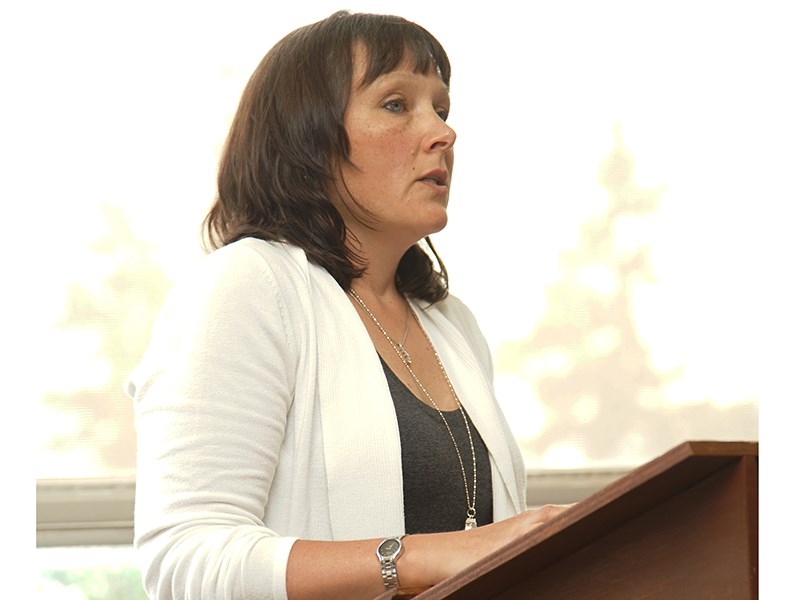Powell River’s Meatless Monday project coordinator estimates pledges to go meatless made by local residents over a four-month period had the equivalent effect of taking 11 cars off the road.
Speaking at the city’s committee of the whole meeting on Tuesday, July 16, Emma Levez Larocque said 360 people participated in Meatless Monday in 182 households in Powell River. In terms of impact on greenhouse gas emissions, the total carbon dioxide equivalent emissions saved by the 360 people who participated was 50,930 kilograms for the period of the project, she added.
If all of the people who pledged during the four months continue with their dietary intake, a total of 165,527 kilograms of carbon dioxide equivalent would be saved, which is equivalent to about 35 cars per year.
If 1,200 people in Powell River went vegetarian for one year, it would be equivalent to about 187 cars coming off the road, said Levez Larocque.
Meatless Monday was endorsed by City of Powell River Council earlier this year and officially launched on March 1, 2019, running until June 28, 2019.
Levez Larocque said she was grateful to have the support of Climate Action Powell River, the city’s sustainability committee and city council to raise local awareness about the many connections between the consumption of animal products and serious environmental and health issues being faced today.
She said during this pilot project she spoke to hundreds of people of all ages who are concerned about these issues.
“Educational programs like Meatless Monday help to change public awareness around this important issue with far-reaching impacts,” said Levez Larocque.
There were several key objectives, which included raising awareness regarding environmental impacts of animal agriculture, particularly with cows. Rejection of animal product consumption affects greenhouse gas emissions, said Levez Larocque.
Raising awareness about the health and longevity benefits of eating more whole plant foods and fewer animal products was also part of the program.
Inspiring people to take part in shared actions to help the community reduce its collective carbon footprint and helping to reduce the local consumption of animal products was another objective, as was increasing the consumption of plant products.
Several tools were developed throughout this campaign. Levez Larocque designed a website full of resources and information about the reasons to reduce consumption of animal-based products. There are recipes and links to other resources for people who want to learn more.
Levez Larocque sent out a newsletter every Monday featuring recipes, websites and information about what was happening with the Meatless Monday campaign locally. Facebook and Instagram pages were also set up to promote the program.
“That became quite active, not just with my postings, but other postings from people who were taking part in the project as well,” she said. “These are established resources that will continue to be ongoing resources for the community.”
The Meatless Monday campaign also participated in 11 events, such as Seedy Saturday and Earth Day. Levez Larocque did cooking demonstrations at grocery stores and tastings of different vegan products at some of the stores as well.
There were two screenings of Cowspiracy, a documentary film that addresses some facts around environmental degradation that the production of animal products causes, according to Levez Larocque.
There was also a wrap-up Meatless Monday potluck held at Ecossentials, with more than 50 people stopping by within a couple of hours.
“They brought lots of food and it was amazing,” she said. “This was a really great opportunity to speak to people one on one.”
The project gave Levez Larocque the opportunity to get out into the community and talk to people who did not have the Meatless Monday concept on their radar.
“I had a lot of conversations that started with ‘no thanks, I’m a meat eater’ that ended up with ‘thanks, I’m going to think about that.’ For me, that was a big win,” she said.
Engaging youth is an important part of the initiative. Levez Larocque said as with any change campaign, youth often lead the way and that was certainly the case in this instance.
“I was inspired by a lot of the young people in our community,” she added.
Levez Larocque said this way of eating is one of the best things people can do for their health. It helps to prevent chronic diseases and helps people stay healthy into their later years, she added.
Similar to early anti-smoking campaigns, it starts with education, and Levez Larocque said that is what this campaign has been about.



